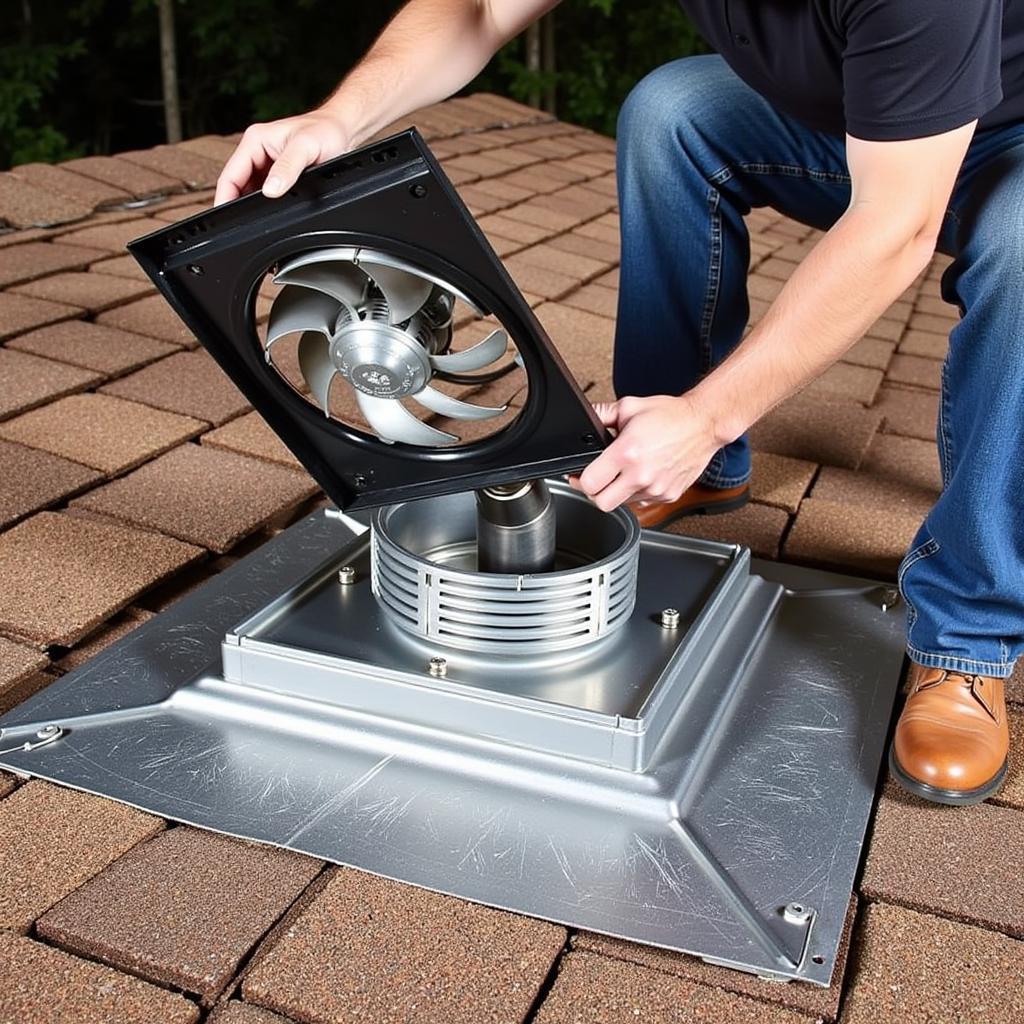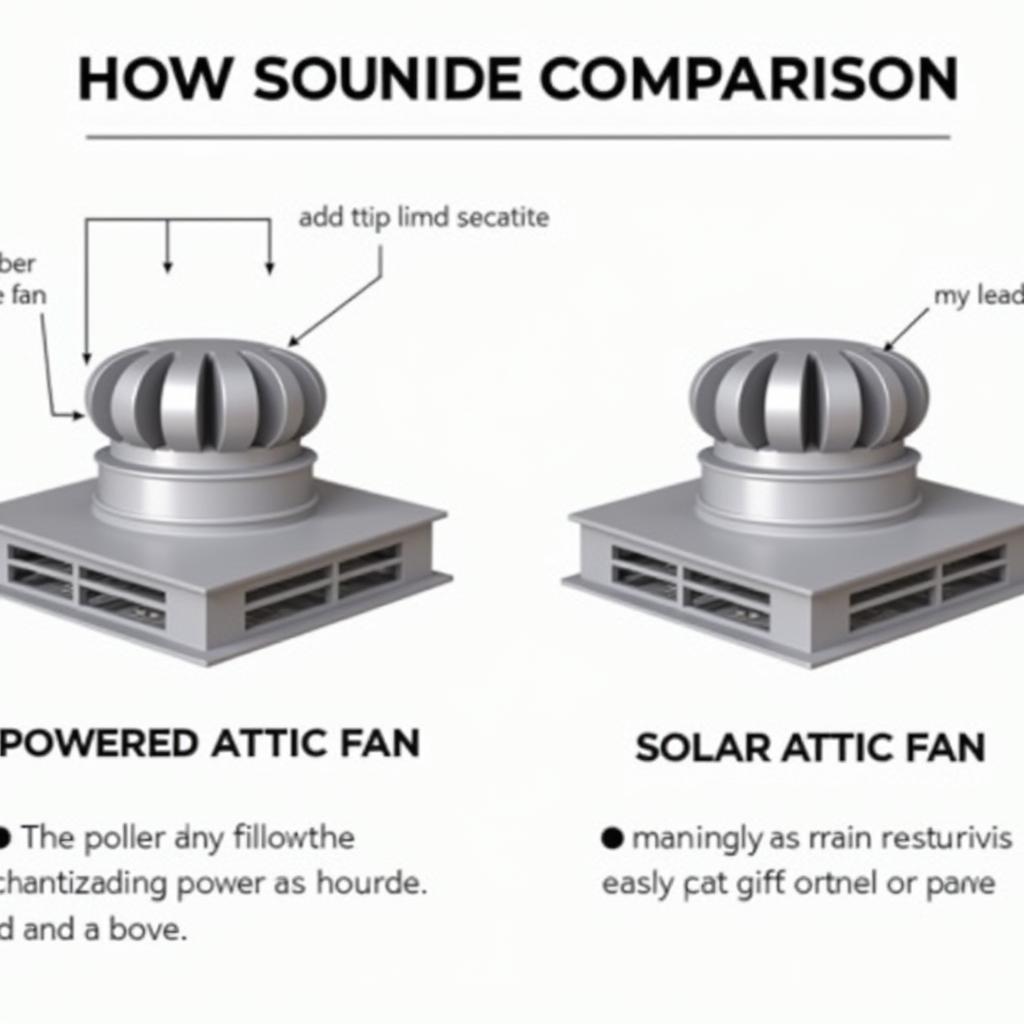Attic fans have been touted as energy-saving wonders, promising to keep your home cooler and your energy bills lower. But Do Attic Fans Really Work as well as advertised? The answer, like many things in life, is a bit nuanced. Let’s delve into the world of attic fans and explore their effectiveness.
Understanding How Attic Fans Function
Before we judge their effectiveness, it’s important to grasp how attic fans operate. These fans are typically installed on gable vents or through a roof vent, working on a simple principle: to draw hot air out of your attic. By expelling the hot, stagnant air, attic fans create negative pressure, drawing cooler air from outside through existing vents.
 Attic fan being installed in a residential home
Attic fan being installed in a residential home
The Pros and Cons of Attic Fans
Like any home improvement solution, attic fans come with their own set of advantages and disadvantages. Understanding these can help you make an informed decision about their suitability for your needs.
Advantages:
- Reduced Attic Temperature: By expelling hot air, attic fans can significantly reduce the temperature in your attic. This can be particularly beneficial during hot summer months when attics can become unbearably hot.
- Lower Cooling Costs: A cooler attic translates to less heat transferring into your living space. This reduced heat load can ease the strain on your air conditioning system, potentially leading to lower energy bills.
- Improved Ventilation: Attic fans improve air circulation, removing excess moisture and stale air. This enhanced ventilation can help prevent mold and mildew growth, improving your home’s air quality.
Disadvantages:
- Effectiveness: The effectiveness of attic fans depends heavily on factors like climate, insulation, and ventilation. They might not be as effective in humid climates or poorly ventilated homes.
- Noise: Attic fans can be noisy, especially powerful models. This noise can be disruptive, particularly if your living spaces are close to the attic.
- Installation: Proper installation is crucial for optimal performance. Improper installation can lead to issues like backdrafting, where the fan draws conditioned air from your living space, defeating its purpose.
When Attic Fans Are Most Effective
Attic fans aren’t a one-size-fits-all solution. Their effectiveness is determined by a combination of factors:
- Climate: Attic fans work best in climates with hot, dry summers. In humid climates, they might not be as effective due to the already high moisture content in the air.
- Insulation: Homes with good attic insulation benefit more from attic fans as they prevent the expelled hot air from being quickly replaced by hot air from the roof.
- Ventilation: Adequate intake ventilation is crucial. Without enough vents allowing cooler air to enter, the fan won’t be able to effectively draw out the hot air.
Types of Attic Fans
There are two main types of attic fans available, each with its own mode of operation:
1. Powered Attic Fans
These fans run on electricity and offer the most powerful ventilation. They are typically controlled by a thermostat, switching on when the attic temperature reaches a certain threshold.
2. Solar Attic Fans
As the name suggests, these fans are powered by solar panels, making them an energy-efficient option. They operate whenever sunlight hits the solar panels, offering continuous ventilation.
 Comparison of powered and solar attic fans
Comparison of powered and solar attic fans
Making an Informed Decision: Is an Attic Fan Right for You?
Deciding whether to invest in an attic fan requires careful consideration of various factors:
- Conduct a Home Energy Audit: A professional energy audit can identify areas of heat gain and assess your attic’s ventilation. This can determine if an attic fan is a worthwhile investment for your home.
- Evaluate Your Climate: Consider your local climate. If you live in a hot, dry area, an attic fan can be highly beneficial. In humid climates, its effectiveness might be limited.
- Assess Your Budget: Attic fans vary in price depending on their type, size, and features. Factor in installation costs when budgeting for an attic fan.
Conclusion
So, do attic fans really work? The answer is: it depends. While they can be effective in reducing attic heat and potentially lowering cooling costs, their success hinges on factors like climate, insulation, and ventilation. A thorough assessment of your home and its needs is crucial before making a decision. If you’re considering an attic fan, consult with a qualified professional to determine if it’s the right solution for your home and enjoy a cooler, more comfortable living space.


